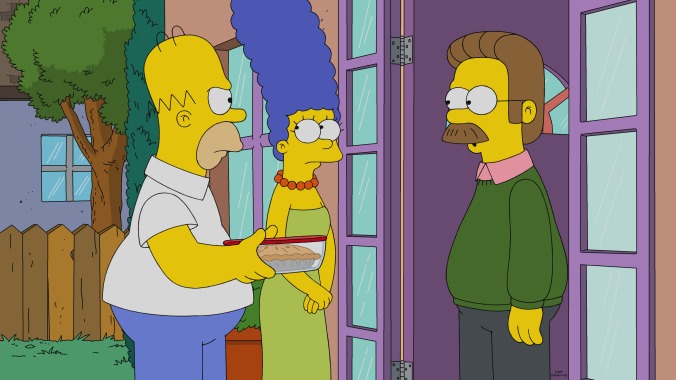

“When will you die?!”
Synopsis of a really great Simpsons episode: Homer spitefully mentors a troubled young boy out of jealousy over Bart’s seemingly perfect new mentor. That episode: Season Four’s “Brother From The Same Planet.
Synopsis of a truly crappy Simpsons episode: Homer spitefully mentors a troubled young boy out of jealousy over Bart’s seemingly perfect new mentor. That episode: This one.
“Better Off Ned” isn’t just a lousy half-hour (minus commercials, minus three episode-ending tags in place of any sort of resolution) of The Simpsons because it’s double-dipping on the same premise. It’s a truly lousy episode because it fairly rings with indifference, glib cruelty, and enough lamp-shading of creative exhaustion to serve as platonic ideal for late-run “is that show still on?” disposability.
Here, the father-son rift is caused by external forces (Bart brings Grampa’s dud grenade to school, gets expelled, and Ned steps up to set the boy right), removing any plot agency from the main characters. Homer, naturally (you know, since he’s had the practice), deals with his petty jealously over Bart’s Neddy-sparked improvement that, stumbling upon a bereft Nelson at the Springfield Dump (motto: “50,000 seagulls can’t be wrong!”) he decides that improving Springfield’s number one bully and neglected grade-schooler will show that Ned—and that Bart—that he can improve a troubled child’s life for selfish reasons. And, sure, that’s a gag dispensed with with such economy in the questionnaire in “Brother From The Same Planet,” but we’re judging “Better Off Ned” on its own goals and execution.
And that’s a problem, since simply everyone in “Better Off Ned” is, to greater or lesser degree, an insufferable asshole. Ned’s taken an interest in the well-being of the Simpsons kids before, of course, and his beneficence has usually come yoked to some measure of evangelical self-righteousness. But here, whatever kindness and guidance he shows to Bart is grossly offset by the episode’s unrelenting portrait of Ned Flanders as a bullying, judgmental, and, in one genuinely shocking aside, secretly terrifying zealot. Responding to Bart’s ketchup bottle fake injury prank, Ned leans in to the boy and sneers, “I can make that real blood, you little punk!” There’s no followup to the moment, leaving us to ponder just how little the episode’s writers care about building a character arc upon literally anything we know about Ned Flanders. Sure, Ned’s reactionary faith is and always has been fair game, but his portrayal all episode is simply a mess, as when he quite bluntly blackmails Superintendent Chalmers into lifting Bart’s expulsion via a churchy group text (on app Prayer-Mid), or when his appropriation of the town’s “pride parade” as a “Christian pride parade” shows him crowing in boorish MAGA/Fox News glee about how “finally, Christians can show their faith.” (Homer’s even proven right when he muses resentfully to Marge that Ned’s laughing at him under cover of his prim mustache.) Ned is traditionally The Simpsons’ vehicle for conservative religious satire, sure, but this Ned is just a jerk.
So’s Lisa, to be honest. Seeing Bart’s walk of shame on Flanders’ arm out of the school, Lisa mocks her brother alongside the other “haw-haw-hawing” members of her French club. Confronted by Homer later for her abrupt face turn when she offers up $40 of her own money to buy her father 10 minutes of therapy time after she decides his child-manipulating scheme is not okay, Lisa’s made to remark, “Dad, I have to be the voice of morality,” before admitting that she really likes being the family/town’s spoilsport. Again, the best characterizations of Lisa Simpson allow for both aspects of her personality to be true, but here, her perfunctorily deployed little sister brattiness and sudden rediscovery of her conscience are plot devices, nothing more. The same dynamic is true for Marge’s minuscule part, where she, too, makes potentially evocative subtext glib text, waving off Lisa’s plea for her to chime in on the complicated emotional stakes of Homer’s vendetta by explicitly stating that her urgent need to change Maggie is just an excuse. Marge’s position as stick-in-the-mud is, at its best, a subtle and illuminating depiction of the role she’s taken on at the expense of her own personhood. Here, it’s a smug one-liner.
That leaves Homer and Nelson. Bart’s momentary flowering at being taught how to catch and cook a fish by Ned quickly wilts under Rod and Tod’s clammy togetherness. (Again, there’s the seed of a better episode in Bart’s reaction to being challenged and praised for succeeding, as Bart’s delighted cry, “I did it! I murdered a fish!” captures the multifarious levels of the duo’s partnership.) Homer’s abused the trust of an unfortunate youth before, as we know, but, here, his decision to whisk the weeping Nelson up in his tutorial on the finer points of billiards and change-stealing at Moe’s and the etiquette of being thrown out by your wife is just as hurried as everything else in “Better Off Ned,” as is their eventual and inevitable dissolution. As in “Brother From The Same Planet,” everyone switches big-little brothers in the end, but there’s no poetic rightness (or even just a big laugh) to the joke—it’s just a way to dispose of a plot.
As for Nelson, look, there’s no reason why literally every character in Springfield can’t get a turn in the spotlight after 31 years. And Nelson Muntz, for all his grade school villainy, has had it rough enough in his short, overgrown life for someone to throw the little thug a bone. Here, we get another glimpse into the depths of the Muntz family dysfunction, mainly at the expense of Mrs. Muntz, whose long-depicted career of substance abuse and bed-hopping is, as ever, played mainly for ugly laughs. Even when she does get her own moment of supposed redemption (begging Homer not to ditch her son as so many of her former lovers have done once they were done with her), it’s whiplash-fast, coming right after she’s shown making an aggressive, bathrobe-clad play for the uninterested Homer’s affections. Nelson’s a tough voice to make sympathetic (it’s been done), although Nancy Cartwright manages to wring a few moments of sympathy toward the lad’s life of squalid loneliness. And while it makes sense that Nelson would revert back to his old lashing-out once he realizes what Homer’s done, the episode hinging on an over-elaborate revenge plot involving a potentially deadly praying hands parade float isn’t much of a resolution.
Speaking of resolving an episode, what is the writers’ continued affinity for appending multiple tags on an episode in favor of—and I’m just spitballing here—using those precious few minutes to flesh out the actual character arcs? Here we see Nelson’s maliciously doodled “The End” pop up right after Homer saves Bart at the parade, only for it to continue, “No, we’re too short.” Then we get a tag where Nelson (and his mom) are having a nice dinner with the Flanders. Then we get another where Nelson reveals to his bullying pals outside the window that he’s got Milhouse trapped shivering in the Flanders’ kitchen freezer. Oh, and Homer shows Bart how his lousy seats at the baseball game give him the perfect peanut-tossing trajectory to nail Flanders in his box seats. For an episode where nobody emerges looking or feeling like themselves (or like anything but hastily sketched jerks), slapping on subpar jokes while the credits flash by is the final, dismissive touch of storytelling apathy.
Stray observations
- Returning to the quote that opens the episode, it was pulled from the one exchange that made me laugh. As Quimby introduces Mr. Burns as the benefactor of this year’s parade, we hear an offscreen voice (I think it’s Lenny) yell out, “Why won’t you die?!” Without missing a beat, Quimby responds, “Mr. Burns will answer questions later.”
- Okay, I did like the gag where, Abe—having seemingly pulled the pin on his grenade—tells Bart to say his prayers. Bart, diving under the bed: “Never!”
- Plus, the sign at the Christian pride parade “Warning, pride is a sin” isn’t bad.
- Even Homer’s therapist is a jerk, kicking poor Gil out the door just as he’s about to achieve a potentially life-changing breakthrough.
- Kirk makes an appearance in a mascot costume, just so there can be a joke about Milhouse crawling up his father’s ass.
